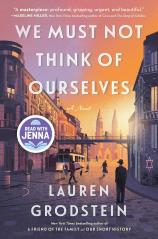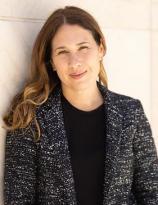We Must Not Think of Ourselves
Review
We Must Not Think of Ourselves
More than 20 years ago, while visiting Israel’s Holocaust memorial, Yad Vashem, I stood on cobblestones taken from the Warsaw Ghetto. I tried to imagine myself in 1940, when the Jews of that Polish city were wrenched from their former lives by the Nazis and imprisoned in an area of one-and-a-half square miles. Trapped and starving, their fate unknown, they resolved to write their own history. A secret group called Oneg Shabbat (the Joy of the Sabbath) built an archive of materials documenting daily existence in the ghetto. It remained hidden until after the war.
This is the backdrop for Lauren Grodstein’s luminous new novel, WE MUST NOT THINK OF OURSELVES (her earlier books include the New York Times bestseller A FRIEND OF THE FAMILY). Clearly, the story has intense personal meaning: If her great-grandparents hadn’t left Warsaw two decades before the war, she writes in an afterword, “in all likelihood, I would not be here.”
As the story begins, Grodstein’s fictional protagonist, Adam Paskow, a teacher of foreign languages, is asked to keep a notebook for Oneg Shabbat (“If they find [it], you could be killed”). Books about the Holocaust sometimes feature larger-than-life leaders or resistance fighters. Adam, by contrast, is quite an ordinary person. He isn’t pious or even strongly self-identified as Jewish. His brother and mother went to Palestine before the war; he stayed in Poland and married Kasia Duda, a woman from a wealthy Catholic family who felt, as he did, that differences in religion or class shouldn’t matter. Both students of English literature, they dreamed of going to London one day. But Kasia suffered a fatal brain injury in a fall. Without her, Adam loses his radar, his “map to the world.” He doesn’t see what is happening until it’s too late.
"[T]his novel is not simply a compendium of research, although I’m sure Grodstein did plenty. It is an act of love and vision, reconstructing life in the ghetto in all its rage, hunger, grief --- and, sometimes, beauty, ingenuity and hope. I wept when I came to the end."
WE MUST NOT THINK OF OURSELVES is a gripping mix of past and present, cruelty and beauty, privation and improvisation. In his notebook, Adam’s personal recollections of a comfortable middle-class life alternate with a searing account of the Jewish community’s fate during the two years following the German invasion (“[T]he fist closed slowly around us”). He also records interviews with his few remaining students --- he teaches them English in a basement classroom, mostly poems he’s memorized over the years (“When I wanted wisdom, I found Dickinson; sorrow, Yeats; company in my grief, Wordsworth”) --- and with members of the Leskovec and Wiskoff families, with whom he shares a cramped one-bedroom apartment.
The interviews are wonderfully vivid snapshots; Adam’s quiet, teacherly presence lets his subjects shine. Grodstein’s description of how the children adapt --- they are eerily adult yet still heartbreakingly innocent --- is one of the most poignant features of this novel. The boys, fearless, are “princes of the ghetto” who smuggle food and supplies from outside the wall, almost turning it into a game. Filip Lescovec, age 11, is an expert scavenger and wood carver; he has built a little shed on top of the apartment building where he crafts miniature animals, often dinosaurs. Adam’s star student, 15-year-old Sfriza Joseph, blond and blue-eyed, comes from a family that once had money, lots of it. But now, her father dead from suicide and her mother a factory worker, she has to be “practical.” She is bold, haughty and unashamed of using her good looks to “make an ally of a German soldier” --- a euphemism that hints at her grim destiny. For these kids, it has become normal to put their bodies on the line. Survival is paramount; the old rules of morality no longer apply.
The adults, meanwhile, try to maintain some semblance of family routine. Mariam Lescovec, mother of Filip and his two brothers, is a gifted cook (she turns raw chicken skin into a delectable treat) and still vain enough to tell Adam that her weight is “none of your business.” Once a successful businessman, Emil Wiskoff now has a position in the Judenrat (the largely powerless Nazi-imposed administration). He witnesses his mother being murdered by a guard on the very day they arrived in the ghetto.
Emil’s wife, Sala, resonated with me most. Candid to a fault, she admits to Adam somewhat guiltily that she didn’t like her late mother-in-law very much and that she married Emil to escape her dead-end small-town existence. When Adam says of the Nazis, “They can’t kill us all,” Sala replies, “Can’t they?” She is devastated that her two sons are missing a real childhood. “This is some sort of strange hell that we try to make as normal as possible so as not to face the truth of it,” she says.
Sala and Adam have already grown close through early-morning talks at the kitchen table; when they shave one another’s heads --- to battle the lice that are fueling a typhus epidemic --- a strange intimacy blossoms. One day, she offers him slices of freshly baked bread (she traded a silk scarf for flour), and he gazes at her: “pale skin, huge eyes, high cheekbones. A cheap burgundy rag around her head. Blue housedress. Thin, chapped lips, gray tooth.” He can barely remember his wife’s “robust, beautiful face.”
The tender scenes between Sala and Adam bring out the texture of their days, the way small consolations exist within the larger horror. Perhaps Grodstein telegraphs a bit too obviously that these two will fall in love, but it doesn’t matter: I wanted them to grab a little joy where they could.
Adam is lucky to have love and work to keep him going, and a few items from “before” --- his wife’s jewelry or bed linens --- to exchange for food or for documents that might offer an escape route. Others have nothing but the watery stew and scant bread doled out by the ghetto’s soup kitchen; still others are dying in the streets. And then, in 1942, deportations to the camps begin, 6,000 people a day. It is the beginning of the end.
Much of what we know about the Warsaw Ghetto comes from Oneg Shabbat, which buried three caches of documentary evidence. Two were unearthed, in 1946 and 1950. The third has never been found. But this novel is not simply a compendium of research, although I’m sure Grodstein did plenty. It is an act of love and vision, reconstructing life in the ghetto in all its rage, hunger, grief --- and, sometimes, beauty, ingenuity and hope. I wept when I came to the end.
Reviewed by Katherine B. Weissman on December 1, 2023
We Must Not Think of Ourselves
- Publication Date: October 29, 2024
- Genres: Fiction, Historical Fiction
- Paperback: 320 pages
- Publisher: Algonquin Books
- ISBN-10: 1643756362
- ISBN-13: 9781643756363




